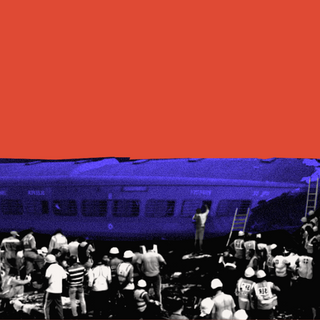
RPF Train Killing Forces Us to Pay Attention to Impunity
A video of a uniformed constable killing Muslim passengers and urging others on how to vote prompts urgent questions.

On Monday, a Railway Protection Force (RPF) constable shot dead four people aboard the Jaipur-Mumbai Central Superfast Express. The 33-year-old Chetan Singh fired 12 rounds as the train moved through the outskirts of Mumbai, first killing his senior officer, Assistant Sub-Inspector (ASI) Tikaram Meena, before moving through the coaches and shooting dead three passengers, reported The Indian Express. The passengers who lost their lives in the incident have been identified as Abdul Kaderbhai Bhanpurwala, Sadar Mohammed Hussain, and Asghar Abbas Shaikh. Reportsnote that the incident appears to be a hate crime.
The Hindustan Times noted that “All three passengers were bearded,” adding that while Bhanpurwala was killed in the same compartment as ASI Meena, Singh then moved through coaches, leaving several passengers unharmed, until he came upon Shaikh and Hussain. A video shot by passengers that is circulating online allegedly shows Singh standing next to a body, saying, “… Pakistan se operate hue ye, aur media yehi coverage dikha rahi hai, unko sab pata chal raha hai ye kya kar rahe hain… Agar vote dena hai, agar Hindustan mein rehna hai to mai kehta hoon Modi aur Yogi, ye do hain.” (“They operate from Pakistan, this is what the media of the country is showing, they have found out, they know everything, their leaders are there… If you want to vote, if you want to live in India, then I say, Modi and Yogi, these are the two…”) However, the authenticity of the video is yet to be confirmed, with officials noting the possibility of it being morphed.
Singh’s superior officer claimed that Singh was known to be “hot-headed” and was “suffering from mental issues,” reported The Indian Express. In the aftermath of the incident, several leaders have commented on the issue, with Congress general secretary Jairam Ramesh stating, “The cold-blooded murders carried out by a RPF constable is the result of a hyper-charged and highly polarised news media and social media atmosphere. The genie of hate is now out of the bottle and it will take a lot of collective effort to put it back in.”
While Singh was soon arrested and an investigation is ongoing, the incident itself raises several questions about the prevailing culture of impunity in the country. The UN Commission on Human Rights has defined impunity as the “impossibility, de jure or de facto, of bringing the perpetrators of violations to account—whether in criminal, civil, administrative or disciplinary proceedings—since they are not subject to any inquiry that might lead to their being accused, arrested, tried and, if found guilty, sentenced to appropriate penalties, and to making reparations to their victims.” The fight against impunity, to bring state actors to justice, has become entrenched in human rights movements across the world, and particularly in India.
Related on The Swaddle:
At Least 1,189 People Were Tortured in Police Custody In the Last 3 Years: Govt
Cases of extrajudicial killings, hate crimes, fake encounters, custodial deaths, and police brutality are often justified under the overarching argument of protecting “national security.” This influences public perception of security forces, too. The Status of Policing in India Report (SPIR) 2018 highlighted how one in every two people condoned police violence towards criminals.
In Singh’s case, however, the victims were innocent passengers. Many on Twitter have pointed out how the recent case was a crime driven by hatred, revealing the heightened polarization in society. It also reiterates what many reports have documented in the past – how marginalized communities often bear the brunt of police brutality. According to Article 14, the SPIR report also highlighted how the public perceives the police to be discriminatory towards people belonging to minority communities. Meanwhile, another survey from 2019 cited by the article found that “One in five police personnel felt that killing criminals is better than a legal trial, and three in four believed that it was justified for the police to be violent towards criminals.” The report further stated that one in every two police personnel “believe Muslims are naturally prone to committing crimes, 35% believe the same of Dalits and 31% of Adivasis.”
As Mohsin Raza Khan, Associate Professor and Executive Director of the Center for a New South Asia at the Jindal School of International Affairs, O.P. Jindal Global University, said in 2021, “This culture of impunity exists because of the lack of rule of law. This includes both a dysfunctional judicial system as well as a dysfunctional policing system. If there is no punishment for any crime and people feel they can get away with it, then you will have impunity.” Khan added that, in the absence of the rule of law, a belief that “might is right” emerges, where justice becomes a matter of power and connections. “The reason the system is this way is because the rulers want it and the voters, that is majority of the public, also does not mind,” he told Asia Democracy Chronicles.
The culture of impunity reveals a deeper problem – one where state actors have rarely been held accountable for their actions, with the legal system granting procedural immunity under Section 197 of the Code of Criminal Procedure, 1973, which states that a public servant accused of committing an offense while purportedly acting in the discharge of official duty requires the Centre’s sanction before a court can take cognisance of the matter.
Such sanctions are rare, even in cases where victims approach trial courts for remedy, noted Ravi Singh Chhikara and Alisha Luthra. If trial courts do take up the case, “since the police serve to maintain law and order by preventing crimes and apprehend suspects, any brutality committed by a cop on the accused or suspect is wrongly and consistently declared as an act committed in the discharge of public duty by trial courts.”
In Singh’s case, the Government Railway Police has organized an SIT probe into the matter. “It is too early to jump to any conclusion, and at this stage, it will be premature to comment anything and share any details about the probe,” GRP commissioner Ravindra Shisve told reporters. Meanwhile, officials have announced compensation to the family of ASI Meena and the families of the three passengers.
Ananya Singh is a Senior Staff Writer at TheSwaddle. She has previously worked as a journalist, researcher and copy editor. Her work explores the intersection of environment, gender and health, with a focus on social and climate justice.
Related


Why the Economic Marginalization of Indian Muslims Is Systemic
